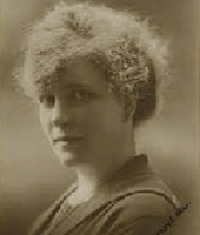
1881-1951
Ethel Annakin Snowden (Viscountess Snowden) was a British socialist and feminist politician. From a middle-class background, she became a Christian Socialist through a radical preacher and initially promoted temperance and teetotalism in the slums of Liverpool. She aligned to the Fabian Society and later the Independent Labour Party, earning an income by lecturing in Britain and abroad. Snowden was one of the leading campaigners for women’s suffrage before the First World War, then founding the Women’s Peace Crusade to oppose the war and call for a negotiated peace. After a visit to the Soviet Union she developed a strong criticism of its system, which made her unpopular when relayed to the left-wing in Britain.
Annakin married the prominent Labour Party politician and future Chancellor of the Exchequer, Philip Snowden. In the 1920s she was appointed as a Governor of the BBC and as a Director of the Royal Opera House. After husband’s death, she resumed temperance campaigning as well as journalism.
Annakin Snowden, who accompanied Mr. Ramsay MacDonald and Mr. Tom Shaw on their visit to Georgia in the 1920s, shared her impressions about visit with the Manchester Guardian.
MRS. SNOWDEN’S IMPRESSIONS
By a Woman Correspondent.
London, Monday.
“Georgia,” said Mrs. Snowden “has had experiences of warfare with Turks, Armenians, and Bolsheviks. Prices are still very high, and the exchange is heavily against her. But the people are full of hope and determination. They have set up what is the most perfect Socialism in Europe, and from what I could see the dispossessed aristocracy, are acquiescing in the new conditions. I met princes and nobles by the score who are now earning their living as chauffeurs or clerks or in other employments, and, so far from complaining about the Government, they justified it. This, too, was the attitude adopted by a dispossessed princess whom I met. Of course, there are others who resent the change, but apparently they have gone to live elsewhere.
I was immensely struck by the difference between the appearance of the people in Georgia and in Russia. The constant sight of misery in Russia was intolerable. The Georgians were in a physical condition infinitely superior to the Russians. They looked well fed and well clothed, and, above all, genuinely happy. There was no terror in their faces. There were no demonstrations arranged by military order.
As we went from town to town and village to village the people who had been told we were coming came in the friendliest way to welcome us. They brought us gifts of fruit and wine and — according to their traditions of hospitality — bread and salt. They danced their national dances for us, but it was all spontaneous and natural.
“The fact that these people are not, like the people of Azerbaijan, dominated by the Bolsheviks, but are opposed to Bolshevism in practice and in theory, makes it easier for them to trade with other countries, and this, with their more ample supplies, accounts for their well-fed appearance.”
The Manchester Guardian newspaper, October 12, 1920

